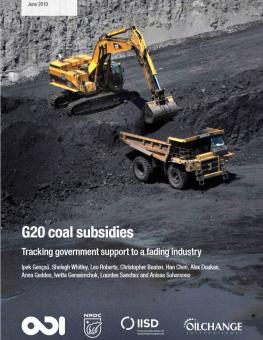
G20 Coal Subsidies: Tracking government support to a fading industry
This research tracks each G20 country’s progress in phasing out subsidies to the production and consumption of coal (including coal-fired power), looking at fiscal support, public finance and state-owned enterprise investment.
Key Messages
- G20 countries have a critical role to play in leading efforts to combat climate change, as they account for 79 per cent of global greenhouse gas emissions. In 2009, they committed to phasing out fossil fuel subsidies in the medium term, and since then many have played an important role in driving forward climate action internationally.
- A decade on from this commitment, G20 governments continue to provide billions of dollars of support for the production and consumption of fossil fuels, spending at least USD 63.9 billion per year on coal alone, the most polluting fossil fuel. They have also neglected to define or document the full extent of their subsidies.
This research tracks each G20 country’s progress in phasing out subsidies to the production and consumption of coal (including coal-fired power), looking at fiscal support, public finance and state-owned enterprise investment. The report summarizes key findings from 18 parallel country briefs, with accompanying data sheets that list all the support identified for each country.
You might also be interested in
At long last, Canada restricts oil and gas subsidies (except for all the loopholes)
Environment and Climate Minister Steven Guilbeault has unveiled detailed plans to phase out "inefficient" oil and gas subsidies, based on guidelines released yesterday morning that take effect immediately and are meant to fulfill a 14-year-old pledge by G20 countries.
Heatwaves to hit China once every 5 years as global extreme weather events multiply, study finds
Record-breaking heatwaves that have scorched North America, Europe and China are set to worsen in future unless the world stops burning fossil fuels, according to a study by the World Weather Attribution (WWA) academic initiative.
Canada to Cut Oil & Gas Subsidies
The Canadian federal government has implemented a framework to revoke subsidies for fossil fuels that are deemed inefficient. However, the framework lacks details on the specific subsidies to be eliminated and does not provide a dollar amount for the cuts. Canada, as the fourth-largest oil producer in the world, is the first country to comply with a 2009 pledge made by the Group of Twenty (G20) nations. The government plans to exempt oil and gas projects that have plans to reduce emissions and utilize carbon capture and storage (CCS) technology. Federal Environment Minister Steven Guilbeault stated that the objective is for federal support to be directed only towards projects that decarbonize the sector and result in significant greenhouse gas emissions reductions.
Canada Bans Some Fossil Fuel Subsidies, Meeting Decade-Old G-20 Pledge
Canada revealed new rules to ban some fossil fuel subsidies, targeting those that unfairly advantage oil and gas, solely support sector activities or endorse consumption of fuels that worsen climate change.